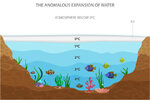 Water is a unique substance, and one of its most remarkable properties is its anomalous expansion. Unlike most substances that contract as they cool, water behaves differently, expanding as it cools down to a certain point. This fascinating behavior has important implications for life on Earth and various natural processes.
Water is a unique substance, and one of its most remarkable properties is its anomalous expansion. Unlike most substances that contract as they cool, water behaves differently, expanding as it cools down to a certain point. This fascinating behavior has important implications for life on Earth and various natural processes.
- Unusual Behavior: Most substances contract when they cool and expand when they heat up. Water, however, follows a different path. It contracts as it cools from room temperature down to about 4 degrees Celsius (39.2 degrees Fahrenheit).
- Maximum Density: At approximately 4 degrees Celsius, water reaches its maximum density. This means that water is heaviest at this temperature, and objects will sink or settle to the bottom of a container more effectively. This property is crucial for aquatic life.
- Expansion Below 4°C: Below 4 degrees Celsius, as water cools further, it begins to expand again. This behavior continues until it freezes at 0 degrees Celsius (32 degrees Fahrenheit). This is why ice is less dense than liquid water, which is why ice floats.
- Life-Sustaining: The anomalous expansion of water has profound implications for life in aquatic ecosystems. Bodies of water freeze from the top down, insulating the aquatic life below and allowing it to survive in cold winter months.
- Climate and Weather: The expansion of water upon freezing also affects climate and weather patterns. Bodies of water can moderate temperature changes in their surroundings, influencing the climate of nearby regions.




